人教版高一英语知识点梳理五篇精选
人教版高一英语知识点总结五篇

人教版高一英语知识点总结五篇人教版高一英语知识点1虚拟条件句条件状语从句是非真实情况,在这种情况下要用虚拟语气.l-条件从句与现在事实不一致,句型为:If+主语十过去时,tiag+should (could,would,或might)+动词原形,例如:If lwere you,1 would study hard.2.条件从句与过去事实不一致,句型为:If+主语+had+过去分词,主语+should(could,would,或might)+have+过去分词,例如:If I had not studied hard.1would have failed in thee_am last term3.条件从句与将来事实不一致,句型为:lf+主语+should/were to+do,主语+should( could.)+原形do,例如:If lwere to go to the moon one day,I could see itwith my own eyes.注意:1.If条件句中绝对不可出现〝would〞.2-根据句中的时间状语,有时可能出现〝混合虚拟〞的情况,即主句可能是现在的情况,条件句也许是发生在过去的情况,但都遵守上述句型.3.在条件句中如果出现were,had,should可省去if将这些词提前置于句首构成倒装,例如:w.re I to go tothe moon one clay,1 would see it with myown eyes.如果有一天我登上月球,我就可以亲眼目睹它的样子了.人教版高一英语知识点2raise vt.〝使……上升;升起;提高〞等;rise vi.〝上升;升起〞;arise vi.〝站起来(stand up)〞,〝起床(get up)〞rise和arise用作站起,起床都属正式用法;arise主要表示〝出现.发生〞等意思.She raised her voice in anger. (抬高)The wind raised the fallen leaves from the ground. (刮起)The child rose from the ground and ran to his mother. (=The child raisedhimself from the ground and ran to his mother.) (爬起)She rises before it is light. (起床)Difficulties will arise as we do the work. (出现)人教版高一英语知识点3一. 直接引语和间接引语(一)直接引述别人的原话,叫做直接引语;用自己话转述别人的话,叫做间接引语.间接引语一般构成宾语从句.直接引语必须放在引号内,间接引语则不用引号.直接引语改为间接引语时,除将引语部分变成宾语从句外,还必须对直接引语中的人称.时态.指示代词.时间状语.地点状语等进行改变.1. 时态的变化:直接引语变为间接引语时,通常受转述动词said,asked等的影响而使用过去化的时态,即把原来的时态向过去推,也就是一般现在时变为一般过去时,现在进行时变为过去进行时,等等.例如:Tom said to me,〝My brother is doing his homework.〞→Tom said to me that his brother was doing his homework.2. 人称代词.指示代词.时间状语.地点状语等等的变化: 根据意义进行相应的变化,例如:She asked Jack,〝Where have you been?〞→S he asked Jack where he had been.He said,〝These books are mine.〞→He said that those books were his.(二)直接引语改为间接引语时,都使用陈述语序,但是因为原句的句式不同,所以变成间接引语时所用的连词会有所不同.直接引语如果是一般疑问句,用连接词whether或if;如果是特殊疑问句,则用疑问词引导间接引语.转述的动词一般用asked,可以在其后加上一个间接宾语me,him, her, us等.如:She said,〝Is your father at home?〞→She asked me if/whet her my father was at home.〝What do you do every Sunday?〞My friend asked me.→My friend asked me what I did every Sunday.直接引语如果是祈使句,改为间接引语时,要将祈使句的动词原形变为带to的不定式,并在不定式的前面根据原句的语气(即请求或命令)加上ask, tell,order等动词,如果祈使句为否定式,则在不定式前加not.其句型为:ask / tell / order someone (not) to dosomething. 例如:She said to us,〝Please sit down.〞→She asked us to sit down.He said to him,〝Go away!〞→He ordered him to go away.He said, 〝Don’t make so much noise, boys.〞→He told the boys not to m ake so much noise.二. 各种时态的被动语态被动语态概述被动语态的概念:它是动词的一种形式,表示主语与谓语之间的执行或被执行关系.主动语态表示主语是谓语动作的执行者,例如:They saw thelittle boy crying by the river. 被动语态表示主语是谓语动作的承受者,例如:The little boy was seencrying by the river.被动语态的构成被动语态的形式是由〝助动词be+动词的过去分词〞构成.助动词be随着主语的人称.数.时态等的不同而变化.几种常见时态的被动语态形式如下:1. 一般现在时 am/is/are + 过去分词例如:Rice is planted in the south of China.2. 一般过去时 was/were + 过去分词例如:These trees were planted the year before last.3. 一般将来时 will/shall + be + 过去分词例如:A sports meeting will be held ne_t week in our school.4. 现在进行时 am/is/are + being + 过去分词例如:Your radio is being repaired now.5. 过去进行时 was/were + being + 过去分词When he got there, the problem was being discussed.6. 现在完成时 have/has + been + 过去分词His work has been finished.Has his work been finished? Yes, it has. / No, it hasn’t.7. 过去完成时 had + been + 过去分词注意:1.除了be之外的其它系动词如get, stay等也可以和过去分词构成被动语态.例如:Their questions haven’t gotanswered.2. 含有情态动词的谓语变成被动语态使用〝情态动词+ be + 过去分词〞结构.例如:More attention should be paid to the old in this country.This work can’t be done until Mr. Black comes.3. 含有〝be going to〞, 〝be to〞等结构的谓语,其被动语态分别用〝be going to + be + 过去分词〞和〝be to+ be + 过去分词〞.例如:The problem is going to be discussed at the ne_t meeting.All these books are to be taken to the library.4.被动语态与系表结构的区别:〝连系动词+用作表语的过去分词〞构成的系表结构,与被动语态的形式完全一样,所以应注意它们的区别.被动语态中的过去分词是动词,多强调动作;系表结构中的过去分词相当于形容词,多强调状态.前者通常可用by引出动作的执行者,而后者则不可以.例如:The map was changed by someone.(被动结构)That custom remained unchanged for many centuries.(系表结构) 系表结构中的过去分词通常可被very修饰,被动语态中的过去分词往往要用much修饰.例如:He was very e_cited.(系表结构)He was much e_cited by her words.(被动结构)5. 主动形式表被动意义.有些动词的主动形式有被动意味,如 open, read,sell, shut, wash, wear,write等.此时句子的主语一般是物.例如:These books sell well. 这些书很畅销.The door won’t shut. 这门关不上.The clothes wash well. 这些衣服很好洗.人教版高一英语知识点41. be good to 对......友好 be good for 对......有益;be bad to…/be bad for…2. add up 加起来增加 add up to 合计,总计add… to 把......加到......3. not…until/till 意思是〝直到…才〞4. get sth/sb done 使......完成/使某人被......5. calm down平静下来6. be concerned about 关心关注7. 当while, when, before, after 等引导的时间状语从句中的主语与主句的主语一致时,可将从句中的主语和be动词省去.While walking the dog, you were careless and it got loose. 8. cheat in thee_am 考试作弊9. go through 经历;度过;获准,通过 10. hide away 躲藏;隐藏 _. set down 写下,记下_. I wonder if….. 我不知道是不是…. _. on purpose 故意_. sth happen to sb 某人发生某事sb happen to do sth 某人碰巧做某事 it so happened that ......正巧碰巧_. It is the first (second…) that… (从句谓语动词用现在完成时) _. in one’s power处于......的控制之中 _. It’s no pleasure doing…. 做…..没有乐趣It’s no good/ use doing sth. 做某事是没好处/没用的_. She found it difficult to settle and calm down in the hiding place.it做形式宾语 _. suffer from 患…病;遭受_. so…that… /such…thay…20. get tired of…. 对…感到劳累疲惫_. have some trouble with sb/sth. 在......上遇到了麻烦 _. get along with sb/sth.与某人相处23. ask(sb)for advice. (向某人)征求建议24. make 后接复合宾语,宾语补足语须用不带to 的不定式.形容词.过去分词.名词等.常见的有以下几种形式:make sb. do sth.让 (使)某人做某事 make sb. /sth. +adj. 使某人/物…make sb./ oneself +v-ed 让某人/自己被…When you speak, you should make yourself understood. make sb.+n. 使某人成为…25. alone /lonely. 单独的/孤独的26. I would be grateful if… 委婉客气提出请求27. Why not do….. = why don’t youdo…人教版高一英语知识点5一.单词1.重点单词讲解.(1)add① add …to… 把…添加…/把…加起来② add up to 共计,总共③ add to 增添(2)upset过去式:upset 过去分词:upset 现在分词:upsettingadj.心烦意乱的,不安的,不适的be upset about/over 为某事心烦.不安be upset that 心烦vt.使不安,使心烦It upsets sb that 让某人心烦的是It upsets sb to do sth 做某事使某人不安(3)concernvt. 使担心,顾虑,涉及,关系到n. 担心,关注,利害关系①as far as sb/sth + be concerned 就某人而言,对于某人来说as far as I am concerned 就我而言,对于我来说as far as he is concerned 对他来说as far as English is concerned 关于英语,对于英语②be concerned about/for 关心,挂念have no concerned about/for③be concerned in/with 涉及到,与…有关have no concerned in/with(4)go through①经历,遭受,忍受 go through one difficulty after another.经历一个又一个困难.②仔细检查,审查 go through your paper 检查你的试卷.③浏览,翻阅 go through all the related reference.浏览相关资料.④通过,穿过=pass through go through a great forest.穿过一片大森林.⑤完成 go through the task.完成任务.(5)suffer①suffer 作〝遭受〞时,后面直接接pain, loss, injury, harm或punishment.②suffer 作〝受…苦〞时,常常搭配:suffer from(6)get/be tired of 厌烦…get/be/feel tired of sb / sth / doing sth 厌烦be tired from 由于…而疲劳(体力上的疲劳),侧重原因be tired out 精疲力竭的(7)join in 参加,加入区别join ,join in ,attend 与 take part in:join:多指加入组织,团体,党派等,有作为其中一员的意思.例:join the army 参军join in:参加某项游戏,活动,讨论等.常用结构:join sb in例:Will you join us in a walk?attend:参加会议,婚礼,葬礼,上课,讲座,听报告等.例:attend a lecture 参加一个讲座.take part in:多指参加群众性的活动,运动,战争等.例:take part in the march.人教版高一英语知识点总结最新五篇。
新人教版高一英语必修一知识点复习整理
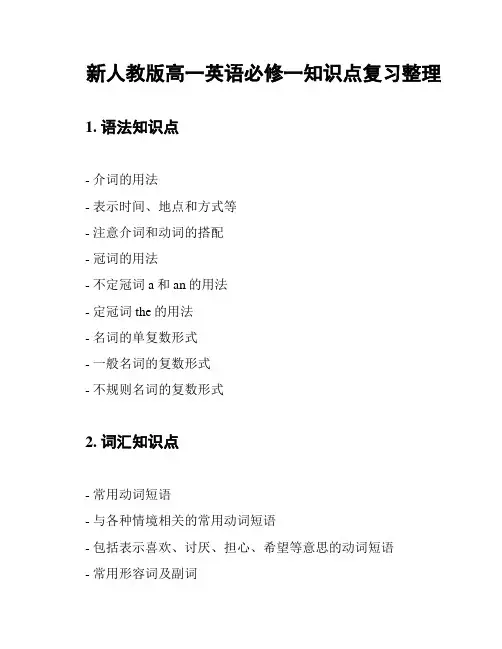
新人教版高一英语必修一知识点复习整理1. 语法知识点
- 介词的用法
- 表示时间、地点和方式等
- 注意介词和动词的搭配
- 冠词的用法
- 不定冠词a和an的用法
- 定冠词the的用法
- 名词的单复数形式
- 一般名词的复数形式
- 不规则名词的复数形式
2. 词汇知识点
- 常用动词短语
- 与各种情境相关的常用动词短语
- 包括表示喜欢、讨厌、担心、希望等意思的动词短语
- 常用形容词及副词
- 描述人、事物特征的常用形容词
- 表示时间、程度、方式等的常用副词- 高频词汇
- 重点掌握高频出现的单词和常用短语3. 阅读技巧
- 预测文意
- 根据上下文预测单词或句子的意思
- 联系上下文理解文章
- 通过上下文的线索来理解全文意思
- 抓住文中关键信息
- 注意文章中的重点句子,理解文章主旨4. 写作技巧
- 语法正确性
- 注意动词时态和主谓一致
- 尽量避免语法错误
- 结构完整性
- 确保文章有开头、主体和结尾
- 逻辑连贯性
- 使用适当的连接词
- 使用连接词使句子和句子之间衔接紧密
以上是《新人教版高一英语必修一》的知识点复习整理,希望对你的学习有所帮助。
人教版高一英语必修一知识点总结
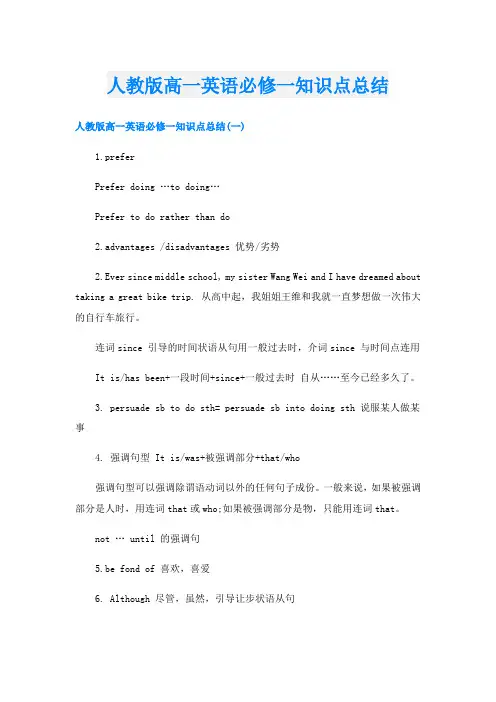
人教版高一英语必修一知识点总结人教版高一英语必修一知识点总结(一)1.preferPrefer doing …to doing…Prefer to do rather than do2.advantages /disadvantages 优势/劣势2.Ever since middle school, my sister Wang Wei and I have dreamed about taking a great bike trip. 从高中起,我姐姐王维和我就一直梦想做一次伟大的自行车旅行。
连词since 引导的时间状语从句用一般过去时,介词since 与时间点连用It is/has been+一段时间+since+一般过去时自从……至今已经多久了。
3. persuade sb to do sth= persuade sb into doing sth 说服某人做某事4. 强调句型 It is/was+被强调部分+that/who强调句型可以强调除谓语动词以外的任何句子成份。
一般来说,如果被强调部分是人时,用连词that或who;如果被强调部分是物,只能用连词that。
not … until 的强调句5.be fond of 喜欢,喜爱6. Although 尽管,虽然,引导让步状语从句① although 从句多在句首, though 从句可在主句前、中、后任何位置,而且though 可以作副词用于句末,作“但是,不过”讲,而although 无此用法。
② as though(仿佛,好像),even though(即使,尽管)中不能用although。
③ though 引导的让步状语从句可以倒装(将表语、状语、情态动词后的动词原形前置到句首,此用法同as),而 although 不可以。
7. insist on doing sth/ sth. 一定要、坚持主张She insists on getting up early and playing her radio loudly.她老是一大早起来把收音机音量开大11.care about 关心在乎care for 喜欢,照料,照顾12.change ones mind 改变主意13. experience 经历/经验14. Once 可作为从属连词,作“一(旦)……就……”解,连接一个表示时间的状语从句。
人教版高一英语必修一知识点总结五篇
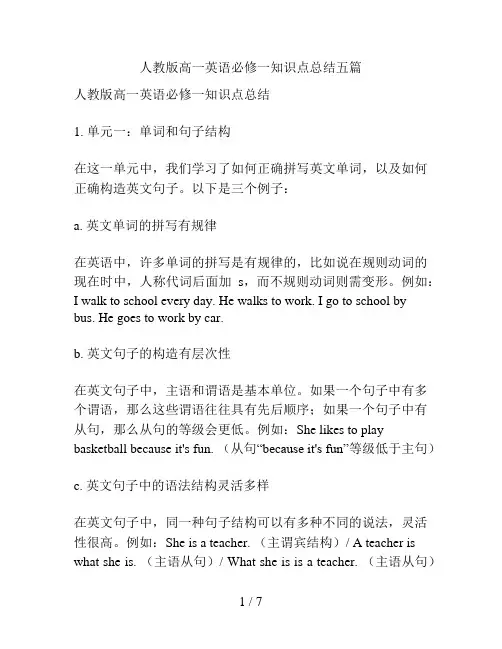
人教版高一英语必修一知识点总结五篇人教版高一英语必修一知识点总结1. 单元一:单词和句子结构在这一单元中,我们学习了如何正确拼写英文单词,以及如何正确构造英文句子。
以下是三个例子:a. 英文单词的拼写有规律在英语中,许多单词的拼写是有规律的,比如说在规则动词的现在时中,人称代词后面加s,而不规则动词则需变形。
例如:I walk to school every day. He walks to work. I go to school by bus. He goes to work by car.b. 英文句子的构造有层次性在英文句子中,主语和谓语是基本单位。
如果一个句子中有多个谓语,那么这些谓语往往具有先后顺序;如果一个句子中有从句,那么从句的等级会更低。
例如:She likes to play basketball because it's fun. (从句“because it's fun”等级低于主句)c. 英文句子中的语法结构灵活多样在英文句子中,同一种句子结构可以有多种不同的说法,灵活性很高。
例如:She is a teacher. (主谓宾结构)/ A teacher is what she is. (主语从句)/ What she is is a teacher. (主语从句)2. 单元二:课文阅读在这一单元中,我们学习了如何正确理解英文课文的内容,并提高了对英文阅读的兴趣和能力。
以下是三个例子:a. 英文课文中的语言运用丰富多样英文课文中的语言运用很丰富,包括比喻、暗示、转喻等等,需要我们认真阅读并理解。
例如:The sky was a bright shade of blue. (比喻)/ Her words cut him like a knife. (转喻)b. 英文课文中的句式多种多样英文课文中的句式也很多样,有短句和长句、简单句和复合句等等。
我们需要慢慢地理解它们,并掌握如何从中获取信息。
人教版高一英语知识点总结归纳5篇分享
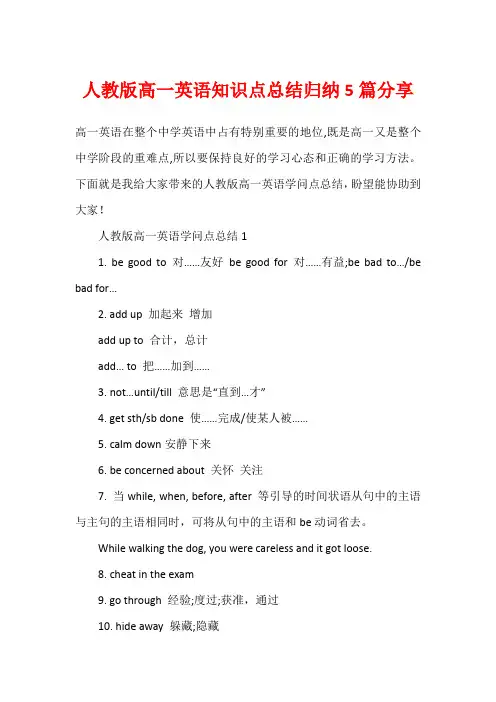
人教版高一英语知识点总结归纳5篇分享高一英语在整个中学英语中占有特别重要的地位,既是高一又是整个中学阶段的重难点,所以要保持良好的学习心态和正确的学习方法。
下面就是我给大家带来的人教版高一英语学问点总结,盼望能协助到大家!人教版高一英语学问点总结11. be good to 对……友好be good for 对……有益;be bad to…/be bad for…2. add up 加起来增加add up to 合计,总计add… to 把……加到……3. not…until/till 意思是“直到…才”4. get sth/sb done 使……完成/使某人被……5. calm down安静下来6. be concerned about 关怀关注7. 当while, when, before, after 等引导的时间状语从句中的主语与主句的主语相同时,可将从句中的主语和be动词省去。
While walking the dog, you were careless and it got loose.8. cheat in the exam9. go through 经验;度过;获准,通过10. hide away 躲藏;隐藏11. set down 写下,登记12. I wonder if….. 我不知道是不是….12. on purpose 存心13. sth happen to sb 某人发生某事sb happen to do sth 某人碰巧做某事it so happened that ……正好碰巧14. It is the first (second…) that… (从句谓语动词用此时此刻完成时)15. in one’s power 处于……的限制之中16. It’s no pleasure doing…. 做…..没有乐趣It’s no good/ use doing sth. 做某事是没好处/没用的17. She found it difficult to settle and calm down in the hiding place. it做形式宾语18. suffer from 患…病;遭遇19. so…that… /such…thay…20. get tired of…. 对…感到劳累疲倦21. have some trouble with sb/sth. 在……上遇到了麻烦22. get along with sb/sth. 与某人相处23. ask(sb)for advice. (向某人)征求建议24. make 后接复合宾语,宾语补足语须用不带to 的不定式、形容词、过去分词、名词等。
人教版高一英语必修一知识点总结五篇
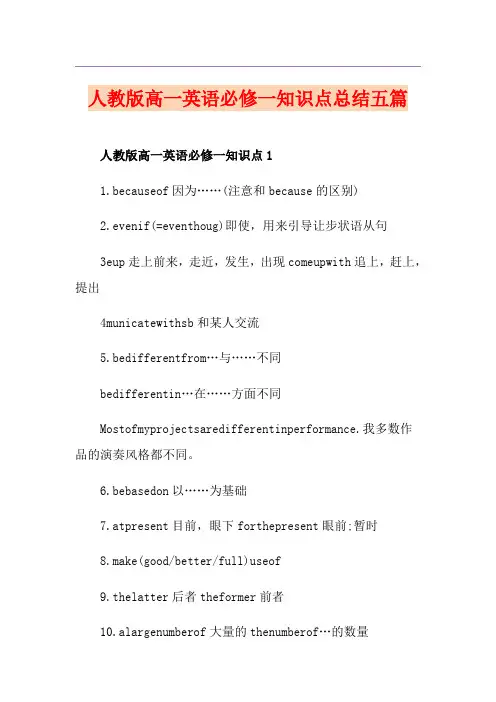
人教版高一英语必修一知识点总结五篇人教版高一英语必修一知识点11.becauseof因为……(注意和because的区别)2.evenif(=eventhoug)即使,用来引导让步状语从句3eup走上前来,走近,发生,出现comeupwith追上,赶上,提出4municatewithsb和某人交流5.bedifferentfrom…与……不同bedifferentin…在……方面不同Mostofmyprojectsaredifferentinperformance.我多数作品的演奏风格都不同。
6.bebasedon以……为基础7.atpresent目前,眼下forthepresent眼前;暂时8.make(good/better/full)useof9.thelatter后者theformer前者10.alargenumberof大量的thenumberof…的数量11.suchas例如12.holdon坚持住,握住不放;(打电话时)等—会13.…youwillhearthedifferenceintheway(that/inwhich)peoplespe ak.你会听出人们在说话时的差异。
14.playarole/part(in)在…中担任角色;在…中起作用;扮演一个角色15.thesame…as…与……一样16.atthetopof…在…顶上atthebottomof在……底部17.bringup教养,养育;提出18.requestsb(not)todosth.要求某人做/不要做某事19.besatisfiedwith…对……感到满意,满足于20.suggestv.(request,insist…)Isuggestedyoudowhathesays.我建议你按照他说的去做。
Isuggestyounotgotomorrow.我想你明天还是不要去了。
Hispalefacesuggestedthathewasinbadhealth.他苍白的脸色暗示了他身体不好。
史上最全面的人教版高中英语必修一语法知识点总结
史上最全面的人教版高中英语必修一语法知识点总结高一主要语法点必修一:直接引语和间接引语(宾语从句);现在进行时表将来;定语从句必修二:定语从句(非限定定从、定从中的介词前提);被动语态(一般将来时、现在完成时及现在进行时的被动语态)必修三:情态动词;名词性从句(主语从句、宾语从句、表语从句及同位语从句) 必修四:主谓一致;非谓语动词(V-ing) ;构词法必修2 第一单元,非限制性定语从句的第二单元一般将来时的主被动第三单元现在完成时的主被动第四单元现在进行时的主被动第五单元介词+which/whom的用法必修3一二单元情态动词的用法三单元宾语从句和表语从句四单元主语从句五单元同位语从句必修4 第一单元主谓一致第二单 v-ing作主语和宾语的用法第三单元 v-ing作表语,定语和宾语补足语第四单元 v-ing作状语第五单元构词法必修5第一单元过去分词作定语和表语第二单元过去分词作宾语补足语第三单元过去分词作状语第四单元倒装句第五单元省略句Unit One Friendship一、重点短语9. join in 参加(一些活动); take part in 参加(活动) join 加入(组织,团队,并成为其中一员) 10. calm down 冷静下来 11. suffer from 遭受12. be/get tired of…对…感到厌倦 13. be concerned about 关心14. get on/along well with 与…相处融洽 15. be good at/do well in 擅长于… 16. find it + adj. to do sth. 发现做事是… 17. no longer / not …any longer 不再…18. too much 太多(后接不可数n.) much too 太…(后接adj.)19. not…until 直到… 才20. it’s no pleasure doing sth 做… 并不开心21. make sb. sth. 使人成为… make sb. do sth. 使人做事二、语法----直接引语和间接引语概念:直接引语:直接引述别人的原话。
高一英语课本人教版知识点梳理
高一英语课本人教版知识点梳理Unit 1: School LifeVocabulary•school subjects (maths, biology, etc.)•school facilities (classroom, library, etc.)•school activities (sports day, school trip, etc.)•school rules and regulations (uniform, punctuality, etc.)Grammar•present simple tense (facts, habits, schedules, etc.)•imperatives (giving instructions, suggestions, etc.)•expressions of quantity (a lot of, some, any, etc.)Unit 2: Festivals and CelebrationsVocabulary•common festivals and celebrations (Christmas, New Year’s Da y, etc.)•cultural traditions and customs (fireworks, gift-giving, etc.)•holiday activities (decorating, cooking, etc.)Grammar•present progressive tense (actions in progress)•simple past tense (past events)•prepositions of time (on, at, in)Unit 3: Family and FriendsVocabulary•family members (mother, father, etc.)•words to describe relationships (cousin, aunt, etc.)•feelings and emotions (happy, sad, etc.)•possessive (’s)•comparatives and superlatives (comparing things)•adverbs of frequency (always, never, etc.)Unit 4: Society and CultureVocabulary•social issues (poverty, unemployment, etc.)•cultural differences (traditions, beliefs, etc.)•stereotypes and prejudicesGrammar•modal verbs (can, should, etc.)•passive voice (actions done to the subject)•conditional sentences (hypothetical situations)Unit 5: PersonalitiesVocabulary•personality traits (kind, honest, etc.)•character flaws (arrogant, selfish, etc.)•emotions and moods (angry, nervous, etc.)Grammar•gerunds and infinitives (verbs as nouns)•phrasal verbs (verbs with prepositions/adverbs)•indirect speech (reporting what someone said)Unit 6: Science and TechnologyVocabulary•scientific concepts (gravity, DNA, etc.)•technological developments (smartphones, apps, etc.)•environmental issues (pollution, climate change, etc.)•present perfect tense (unfinished actions with a connection to the present)•future tense (predictions, plans, etc.)•conditional sentences (conditional statements)Unit 7: Art and LiteratureVocabulary•famous artists and writers (Leonardo da Vinci, Jane Austen, etc.)•types of art and literature (painting, poetry, etc.)•creative expressions (imagination, inspiration, etc.)Grammar•reported speech (reporting what someone said)•noun clauses (sentences as nouns)•relative clauses (sentences that describe a noun)。
人教版高一英语必背知识点总结梳理5篇
人教版高一英语必背知识点总结梳理5篇人教版高一英语必背知识点总结梳理第一篇:单词拼写1.拼写规则1)名词、动词、形容词和副词的词尾变化规则2)加前缀、后缀3)单词简写:俚语(Sth,Sb等)4)单词读音规则:辅音发音,元音发音5)常见单词拼写错误例:achievement, colleague, conscious第二篇:语法1.时态1)一般现在时2)一般过去时3)一般将来时4)现在进行时5)过去进行时6)现在完成时7)过去完成时2.语态1)主动语态2)被动语态3.倒装句1)全部倒装2)部分倒装3)否定和比较结构的倒装4)虚拟语气和条件状语从句中的倒装例:He is playing basketball.(一般现在时)第三篇:阅读理解1. 词汇理解1)单词含义2)短语含义3)上下文含义2.句子理解1)主谓宾结构2)名词性从句3)定语从句4)状语从句5)非谓语动词6)倒装句、强调句3.篇章理解1)段落主题2)段落结构3)短文结构4)短文主旨例:Who painted Starry Night? The artist behind the painting is Vincent van Gogh.第四篇:写作技巧1.介绍写作1)注意段落划分2)选取合适的过渡词3)注意语序和语法正确4)清楚表达自己的观点2.议论文写作1)突出自己的立场2)准备充分的论据和例子3)针对反对意见进行回应3.作文写作1)根据题目要求选择合适的作文类型2)注意文章结构3)注意语言表达技巧4)文笔要简洁有力例:I like reading English novels.第五篇:口语表达1.基本日常会话1)问候和交际用语2)询问信息和提供信息3)邀请和接受邀请4)表达喜好和观点2.口语技巧1)提高流利度2)准确发音3)把握语音语调4)加强有效沟通3.思路和语言的准备1)事先准备要说的主题和内容2)思索中、英文表达方式的区别3)选择合适的表达方式和词汇4)自信和准确表达观点例:Hi, how are you today?以上是人教版高一英语必背知识点总结梳理的五篇,总结的内容包括单词拼写、语法、阅读理解、写作技巧和口语表达等。
人高一英语知识点总结人教版【5篇】
人高一英语知识点总结人教版【5篇】总结是在一段时间内对学习和工作生活等表现加以总结和概括的一种书面材料,通过它可以全面地、系统地了解以往的学习和工作情况,快快来写一份总结吧。
但是却发现不知道该写些什么,以下是小编收集整理的人高一英语知识点总结人教版【5篇】,供大家参考借鉴,希望可以帮助到有需要的朋友。
人高一英语知识点总结人教版【5篇】1核心单词1、 persuadevt。
说服;劝服;使相信(同convince)常用结构:persuade sb。
of sth。
使某人相信某事persuade sb。
to do sth。
说服某人做某事persuade sb。
into doing sth。
说服某人做某事persuade sb。
out of doing sth。
说服某人不要做某事persuade sb。
that—clause使某人相信……联想拓展talk sb。
into/out of doing sth。
=reason sb。
into/out of doing sth。
说服某人做/不做某事trick sb。
into/out of doing sth。
诱使某人做/不做某事urge sb。
into/out of doing sth。
怂恿某人做/不做某事易混辨析advise/persuadeadvise强调"劝告,建议"的动作,不注重结果;而persuade强调"已经说服",重在结果。
用法上:advise可跟v。
—ing形式作宾语,也可以接that—clause (that sb。
should do),而persuade则不能。
I persuaded him of its truth。
我使他相信这是真的。
We will persuade him to take the medicine。
我们将说服他把药吃下去。
We persuaded her into taking the job。
- 1、下载文档前请自行甄别文档内容的完整性,平台不提供额外的编辑、内容补充、找答案等附加服务。
- 2、"仅部分预览"的文档,不可在线预览部分如存在完整性等问题,可反馈申请退款(可完整预览的文档不适用该条件!)。
- 3、如文档侵犯您的权益,请联系客服反馈,我们会尽快为您处理(人工客服工作时间:9:00-18:30)。
人教版高一英语知识点梳理五篇精选高中学习容量大,不但要掌握目前的知识,还要把高中的知识与初中的知识溶为一体才能学好。
在读书、听课、研习、总结这四个环节都比初中的学习有更高的要求。
人教版高一英语知识点1重点单词minister continent eastward surround harborextremely settle within border figureterrify official wealthy distance flowdowntown tradition broad bush fallschoolmate approximately coast measure chatrapidly scenery manager complete aboardnearby cowboy prize realize slightlydistant urban port fresh tourcross confirm coast重点短语be/go on a trip rather than catch sight ofas well as because of go on a tour ofgo through as far as be surrounded bysettle down have a gift for at dawnbe close to figure out in the distance重点句子1. … there was frost on the ground, confirming that fall had arrived inCanada.2. The thought that they could cross the whole continent was exciting.Some people have the idea that you can …., but they forget the fact that….3. People say it is Canada’s most beautiful city, surrounded by mountainsand the Pacific Ocean.4. It’s so wet there that the trees are extremely tall, some measuring over90 meters.5. The next stop was Calgary, which is famous for the Calgary Stampede.6. The girls were surprised at the fact that ocean ships can sail up the Great Lakes.7. … they could see the misty cloud that rose from the great Niagara Falls,which is on the south side of the lake.As they sat in a buffet restaurant looking over the …,a you ng man sat downwith them.人教版高一英语知识点21) It was the first time in a year and a half that I had seen the night face to face. (从句时态用完成时) 这是我一年半以来第一次目睹夜晚。
2) I wonder if it’s because I haven’t been able to be outdoors for so longthat I’ve grown so crazy about everything to do with nature.(强调句)我不知道这是不是因为我长久无法出门的缘故,我变得对一切与大自然有关的事物都无比狂热。
3) I stayed awake on purpose until half past eleven one evening in order tohave a good look at the moon for once by myself.有一天晚上,我熬到11点半故意不睡觉,为的是独自好好看看月亮一次。
4) Your friend, who doesn’t work hard, asks you to help him cheat in theend-of-term exam.(非限制性定语从句) 你的一个朋友叫你在期末考试中帮他作弊,这个朋友平常不认真学习。
5) If you have some trouble (in) getting along with your friends, youcanwrite to the editor and ask for advice. 如果你在和朋友的相处上有问题,你可以写信给编辑向他征求建议。
6) Add up your score and see how many points you can get.把你的得分加起来,看看得了多少。
7) What he did has added to our difficulties. 他的所作所为增加了我们的困难。
8) His income adds up to $1000 a month. 他每月的收入共计1000美元。
9) Its no pleasure looking through these any longer because nature is onething that really must be experienced. 观看这些已不再是乐趣,因为大自然是你必须体验的。
10) Why is she so concerned about his attitude to her work?她为什么那么关注他对她的工作的看法?11) The police asked him to set down what he had seen in a report. 警察让他在报告中写下他所看见的事情。
12) As I was about to go out and search for him, he happened to come in.正当我打算出去找他时,他恰巧进来。
13) Mr. Jones lives alone and often feels lonely. 琼斯先生单独一人生活,常常感到孤独。
14) We tried to calm him down, but he kept crying. 我们试图让他平静下来,但他仍不停地哭着。
15) Does he dare (to) go out at night in such stormy weather?他敢在这样一个暴风雨夜外出吗?16) The man insisted that he didn’t steal anything and he (shouldbe setfree at once. (陈述语气、虚拟语气这男人坚持自己没有偷东西,他坚持说他应该立刻被释放。
17) She gave me a determined look ?C the kind that said she wouldn’t changeher mind. 她给了我一个坚定的眼神——这种眼神表明她是不会改变主意的。
18) He is so stubborn that no one can persuade him to do anything. 他是如此的固执以致没有人能说服他做任何事。
19) My sister doesn’t care about details. 我的姐姐是不会考虑细节的。
20) She is a determined woman. Once she determines to do something, shewill do it well. 她是个意志坚强的人。
如果她下决心做什么事,就一定要做好。
21) He recorded the important events ad his afterthoughts in his traveljournal. 在旅行日记中,他记下了重大的事件及自己的想法。
22) I am not familiar with this city, because this is my first visit.我对这个城市不熟悉,因为这是我的第一次来访。
23) I don’t think it is necessary for us to give in. 我认为我们没有必要让步。
24) The topics of a travel journal can be different from a diary, often including people, things, and events less familiar to readers.游记的主题可以和日记不同,经常包括那些读者不太熟悉的人和事。
25) It was great fun to put up tents here. 在这儿搭帐篷真好玩。
人教版高一英语知识点3重点短语1. be fond of爱好2. treat…as…把……看作为……3. make friends with 与……交朋友4. argue with sb. about / oversth. 与某人争论某事5. hunt for寻找6. in order to为了7. share…with与……分享8. bring in引进;赚钱9. a great / good many许多…10. have difficulty (in) doing做……有困难11. end up with以……结束12. except for除……之外13. come about发生14. make(a)fire生火15. make yourself at home别拘束16. the majority of大多数17. drop sb. a line给某人写短信18. for the first time第一次19. at all根本;竟然20. have a (good) knowledge of…精通……☆交际用语☆1. i think…i like / love / hate...i enjoy...my interests are...2. did you have a good flight?you must be very tired.just make yourself at home.i beg your pardon?can you tell me how to pronounce...?get it.人教版高一英语知识点4核心单词persuadevt.说服;劝服;使相信(同convince)常用结构:persuade sb. of sth. 使某人相信某事persuade sb. to do sth. 说服某人做某事persuade sb. into doing sth. 说服某人做某事persuade sb. out of doing sth. 说服某人不要做某事persuade sb. that-clause 使某人相信……联想拓展talk sb. into/out of doing sth.=reason sb. into/out of doing sth.说服某人做/不做某事trick sb. into/out of doing sth. 诱使某人做/不做某事urge sb. into/out of doing sth. 怂恿某人做/不做某事易混辨析advise/persuadeadvise强调劝告,建议的动作,不注重结果;而persuade强调已经说服,重在结果。
